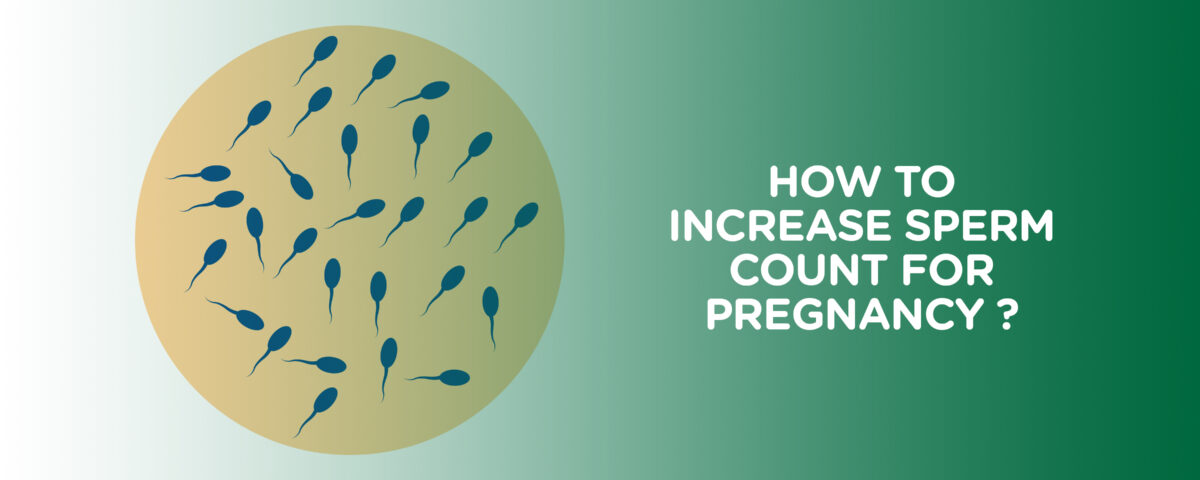
Natural Pregnancy With Low AMH & Low Egg Count
December 5, 2022
Tips For Getting Pregnant With Low Sperm Count
January 19, 2023How To Increase Sperm Count & Make It Stronger For Pregnancy
Planning a pregnancy involves a number of factors, including ensuring a good sperm count. Sperm count is nothing but the average number of sperm per ml of semen. It is a part of regular semen analysis and is one of the most important indicators of male fertility. Let’s find out how to increase sperm count.
What Is Considered A Normal Sperm Count?
A healthy sperm count is 15 million sperm/ml of semen or 39 million sperm/ejaculate. Anything below 15 million is considered sub-normal and may make conception difficult.
There are multiple factors, both genetic and lifestyle, which influence sperm count and the motility of sperm. Healthy choices and an active lifestyle can help increase sperm count, thereby increasing the chances of pregnancy. Let’s dig deeper.
How To Increase Sperm Count
If your semen analysis shows a low sperm count, the doctor will prescribe a few steps that you can take. There are a few natural remedies that you can employ alongside. Here’s how to make sperm stronger for pregnancy naturally.
1. Maintain Healthy BMI
Getting in shape and losing the extra kilos is one of the simplest, most straightforward ways to increase sperm count. Various studies have proven that losing excess weight can improve male fertility by enhancing the volume, motility, and concentration of sperm.
If you are not overweight, you don’t have to worry about shedding fat. But, you must maintain an active lifestyle. Regular exercise and physical activity have a lot of advantages, including a healthy sperm count.
2. Quit Smoking And Limit Alcohol Consumption
Smoking directly affects the quality of sperm. Various studies have shown that even moderate tobacco consumption leads to low sperm count. This is why doctors strictly advise against smoking.
Alcohol, while not as dangerous as smoking, can also play a negative role when consumed regularly/in excess. Keep it limited to protect your fertility.
3. Eat An Antioxidant-Rich Diet
Antioxidants are superfoods! They keep a number of health concerns at bay, such as heart disease, cancer, and infertility! Make sure your diet is rich in vitamin E, vitamin C, zinc, selenium, folic acid, etc.
The foods you can include are green leafy vegetables, tomatoes, watermelon, nuts, seeds, healthy oils, beans, fortified grains, poultry, crab, and oysters.
4. Wear Boxer Shorts
Tight undergarments increase the scrotal temperature which is not good for the sperms. Boxer shorts are loose and can help maintain the right temperature, fostering healthy sperm. If you do not like the idea of boxers, you can also try cotton briefs that are not too tight.
So, these were some natural factors on how to make sperm thicker and stronger. You can follow these steps if you want to work on your sperm count.
How To Increase Sperm Motility
Along with sperm count, motility plays a significant role in male fertility and pregnancy. Thus, you must take steps to increase motility as well. Thankfully, it’s not hard. Here’s what we recommend:
- Quit smoking
- Eat a balanced diet
- Follow an active lifestyle
- Avoid medication that may affect sperm health
Conclusion
If you and your partner are planning to get pregnant, getting the necessary tests done will help you speed up the process. A semen analysis will determine the health of your sperm, after which you can implement steps on how to increase sperm count.
At Plan B Fertility, we provide a range of basic to advanced fertility treatments to help couples get pregnant in the most efficient and safest ways. Visit our fertility clinic in hyderabad to book an appointment with us.



